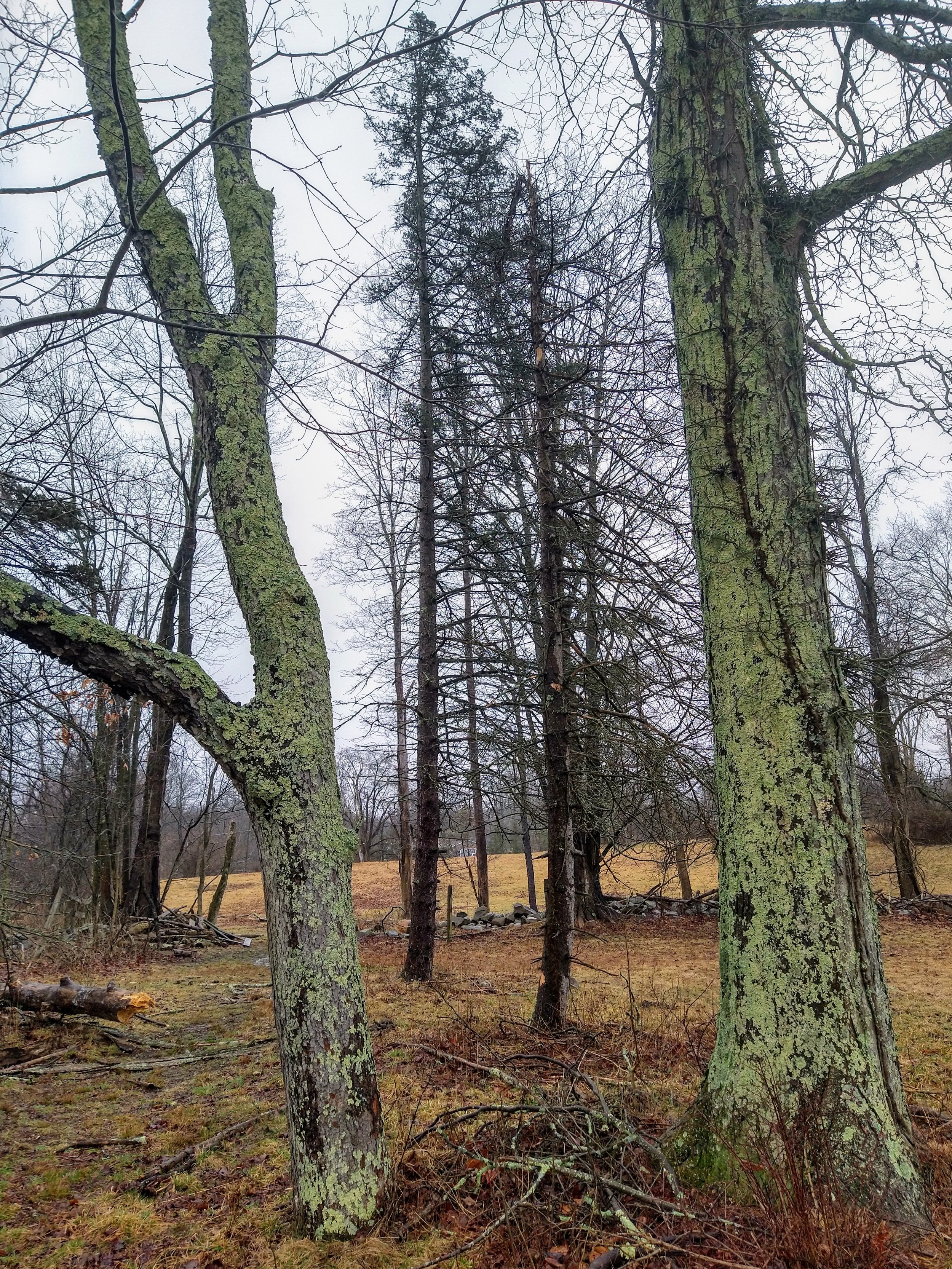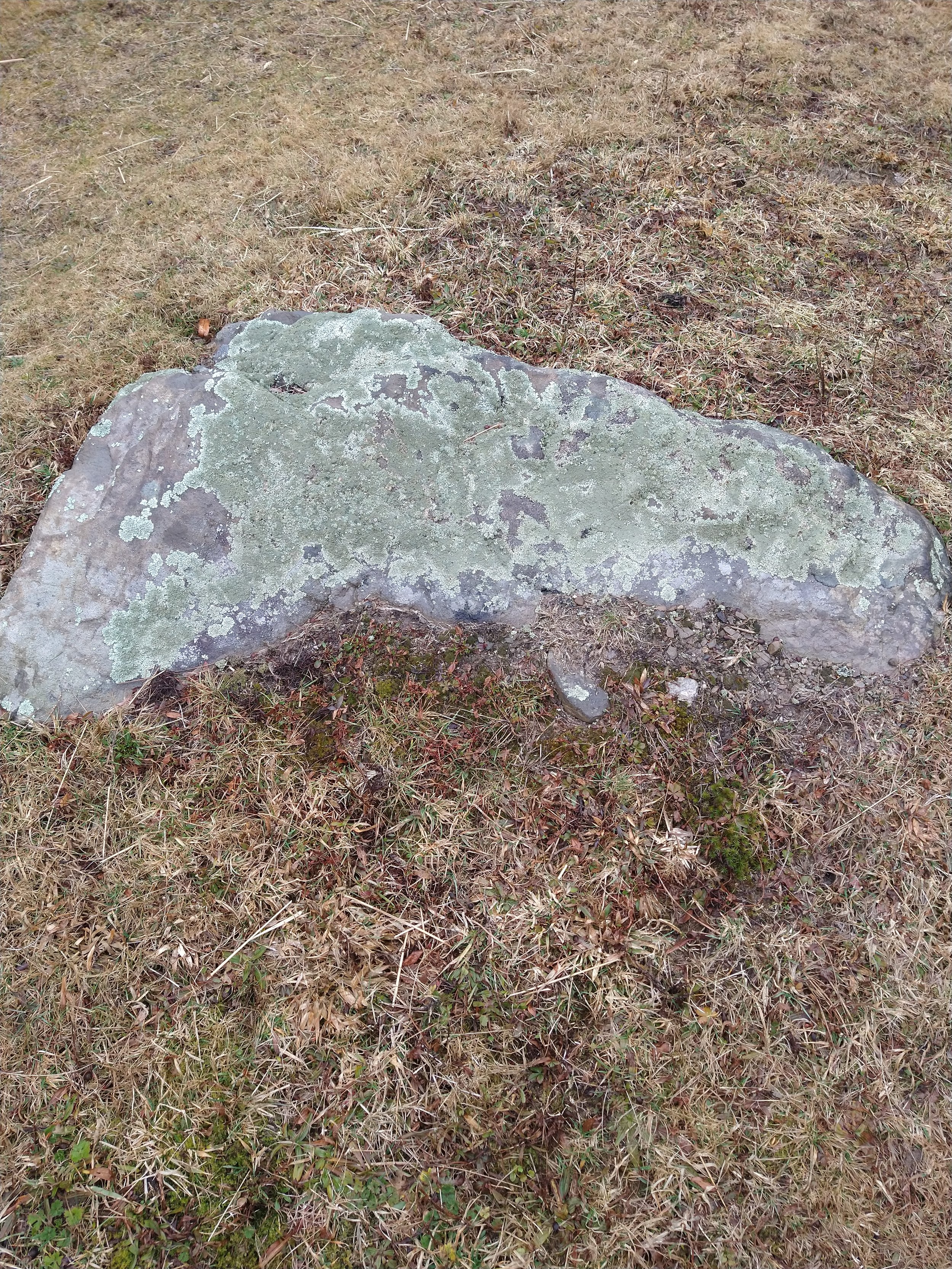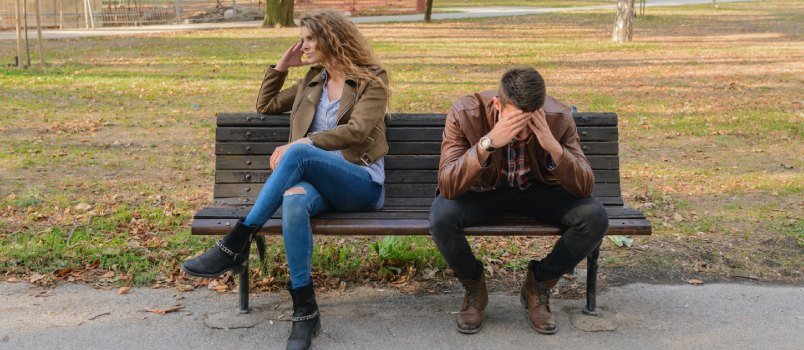Symbiosis
In November we adopted Ripley, a Belgian Malinois puppy. Since that day Jim, my husband, and Ripley have been joining me and our three-year-old Chihuahua, Zoe on our daily walks. The four of us have gone for walks every day (weather permitting) throughout this winter and observed the changes in both Ripley and the landscape. On one of the many damp gray days, Jim commented on how the green on the trees looked brighter. He was pointing out the lichen that grows on the many ash trees that line our country road. In our twenty-four years together I don’t think I have ever heard such an observation as this come from him. I guess he just needed to slow down and get to know our surroundings as well as I do.
For those of you who have forgotten middle-school biology class, allow me to jog your memory (but if you still retain that knowledge feel free to skip ahead a few paragraphs). A lichen is a complex plantlike organism made up of an alga or a cyanobacterium and a fungus growing in symbiotic association on a solid surface. You have all seen it growing on rocks and trees, and if you happened to not notice it, now you will. Where I live lichens are commonly found on tree trunks, branches, and twigs as the bark provides a stable place for them to reside allowing them to collect needed sunlight, rainwater, and materials from the air. They grow on both healthy trees and stressed ones. I’ve noticed that they are very abundant on the dying ash trees and that is because there is less canopy and more available sunlight in those areas. So if you see a dead tree covered in lichen, fear not, the lichen had nothing to do with the tree’s demise. And if you are like Jim and noticed the the color of some lichens is more intense after it rains and want to know why then you’re in luck. “There’s a very good explanation for this phenomenon….. Lichens that turn bright green after it rains contain green algae which contains chlorophyll, a green pigment. When it rains, the fungus (which surrounds the algae) soaks up water like a sponge, causing the fungus to become more transparent, which allows the green pigment of the algae to be seen more clearly.”
I feel like I’m forgetting to explain something. Ah yes - Symbiosis! Just in case you have forgotten what it means, it is any relationship or interaction between two dissimilar organisms. In this case, the fungi and algae mutually coexist to make lichen. Simply put fungi provide shelter to the algae whereas algae provides nutrition to fungi. This means both benefit from the relationship. This specific kind of symbiosis is called mutualism whereas the relationship between lichen and a tree is called commensalism because the lichen benefits from the tree while the tree is neither benefiting nor being adversely impacted by the lichen.


Are you still with me? If so, hang in a little longer. I swear there is a point to all this Biology 101. So now you know two of the four main symbiotic relationships. The other two are parasitism and competition. Parasitism is the relationship between two living species in which one organism benefits at the expense of the other. A tick is a perfect example of a parasite. Competition occurs when two organisms compete for the same limited resource. An example of this that I have been seeing lately on my walks is crows fighting with red-tailed hawks over nesting territories.
Back to my story. As I mentioned in the first paragraph, Jim and I go on walks together. We do a lot together now because he is retired and I have been more or less a stay-at-home mom for 18 years. I’m not going to lie, I thought his being retired would be difficult. We will be married twenty-two years in May and for twenty of those years, we saw very little of each other. He commuted over an hour to work, kept odd hours, and did a lot of overtime. Meanwhile, I held things down at home which with both kids and thirty animals is a full-time job (so I’m never going to retire). However, these nearly two years of having him home all the time have been pretty great. We’ve gotten into a new routine of waking up and going to bed together. Projects that were too big for me to tackle alone get done with his extra hands and muscle. We even have a small business together. The only thing that would make our new arrangement perfect is if he learned how to cook. A girl can dream but then again there is always take-out.
So imagine my excitement when he decided to walk with me. We stroll along with our pups and talk about anything and everything. We notice the alarming amounts of litter along the road and chat with neighbors that we pass (I think it’s time to organize a community cleanup). Most of all we enjoy the beauty of nature together. Finally, Jim is seeing the world through my lens as is evident by his lichen observation.
All this talk about lichens and symbiosis got me to wonder about how human relationships mirror what we see out there in the natural world. Think about the four types of symbiotic relationships I mentioned and then think of the people in your life. Is your interaction one of mutual respect where you both derive benefits? This is the relationship that leaves both parties feeling good about their decision to be in it. Or do you have a commensal one where you receive neither harm nor benefit but the other person benefits greatly? This makes me think of my son. He lives rent-free, eats all the food, enjoys free wi-fi, and in return I get to see his handsome face an hour a day. There is no harm in him being here but there is no great benefit either. Well, at least I know he’s safe and cared for, so there’s that. Are you in a relationship with someone who takes up all your time and resources and leaves you feeling drained and sad? Well, you may be in a toxic relationship with a human parasite. Hate to say it, but there are more than a few out there. Lastly, there is the competitive one. This could look like siblings competing for their parent’s attention or co-workers trying to out-perform one another to get the promotions. Worse still are friends who go out of their way to make you look bad for their own social status or ego aka frenemies.



So all this information leads me to the point of this entire wondering. I liken my marriage to lichen. I explained all this to Jim during our morning walk. He is like fungus, providing me with structure and shelter (he’s responsible for both the fixing of things and the majority of our income). I am the alga supplying him with nourishment (literally and figuratively) so he can grow and spread (not physically but creatively). Together we work. Neither one would want to do all of it alone and we don’t have to because what we have suits us just fine. Of course, this is overly simplified, but I think you get my point.
My point is better relationships make people better. Everyone has a role to play and if you do what you can to the best of your abilities then everyone thrives. So the next time you are with your partner or your friends or even out running errands, think about how you relate to the other people. Maybe you will realize something about yourself and the people with whom you interact.
As always, thanks for taking the time to learn and wonder along with me. I included links to all sorts of information throughout this wondering so you can learn more about lichens, symbiosis, and why humans act the way they do.







